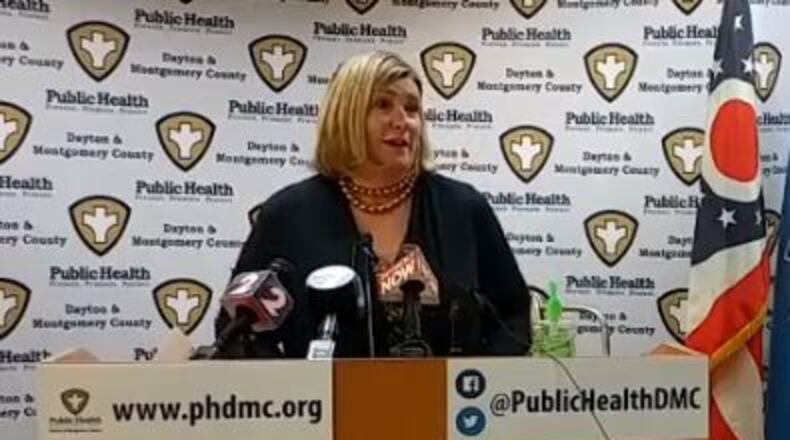>> Coronavirus: Complete Coverage
There are 21 Butler County confirmed cases, two in Champaign, one in Darke, two in Clark, three in Greene, 20 in Miami, 16 in Montgomery, and 10 in Warren, according to the latest update from Ohio Department of Health as well as some additional cases recently recorded by county officials.
There’s a lag in getting results from backlogged private labs, which is delaying some of the tallies.
In Montgomery County, there are 15 confirmed cases, ranging from age 19 to 71. Three are hospitalized.
>> 3.28M filed for jobless claims, reaching
Warren County reported two new COVID-19 cases on Thursday, bringing to 10 the total number confirmed in the community.
The cases reported now include seven men and three women. The ages of those cases range from 22 to 74 years old, the same as they have for the past several days, according to the Warren County Health District’s web site. This is two more than were confirmed on Wednesday.
Public Health - Dayton & Montgomery County Commissioner Jeff Cooper said that there are far more cases in the region than the state’s confirmed tally.
He said the updated epidemic information today from Ohio Department of Health shows currently that people keeping their distance from each other is helping. And that’s helping hospitals meet patient demand, since hospitals have a have limited supplies ventilators and beds as well as masks, gowns and other gear needed to keep workers safe.
“Currently our social distancing is helpful. That’s really good news. It’s helpful. Because it’s helping to extend the limited supply of personal protective equipment that we have available for health care workers, fire/EMS personnel and law enforcement personnel … Social distancing buys us the time to make sure our community can continue to meet that demand,” Cooper said.
>> Coronavirus: State could see 6,000-8,000 news cases a day during surge, Acton says
The state said today that there’s evidence that the “stay at home” order is already starting to reduce spread from what it could have been. The slower the outbreak spreads, the more it buys time for hospitals to prepare and it helps keep the volume of cases manageable.
Following the “stay at home” order closing non-essential businesses, there’s been a flood of calls to Public Health asking what counts as an essential business.
Dayton Mayor Nan Whaley said officials are asking people to not think about how the can get around the order, but to think about how they can be safe. The cases are rising and we can see what’s coming, Whaley said.
“This isn’t something we want you to skirt. This is something we want you to think about safety. We’re trying to save lives here,” Whaley said.
As cases increase exponentially, hospitals need more personal protective equipment but it is difficult to get any new supplies.
Warmer weather on Thursday brought more people outdoors and increased the concern for people spreading coronavirus in the community.
Whaley encouraged people to get fresh air and enjoy the outdoors by biking and walking during the statewide stay-at-home order.
“What we are not OK with is people congregating in the parks. The city of Dayton has allowed the parks to remain open so people can walk through the parks not to have group parties at the parks, not to pay basketball at the parks and not to be on playground equipment. The reason why is we cannot have contact with each other because that is what spreads this virus.”
She reminded people to maintain at least six feet of distance between each other.
Whaley repeated multiple times that one popular warm-weather activity in particular is not allowed.
“Do not play basketball. We are enforcing this with police. Do not play basketball,” she said.
Whaley also spoke about voting in the Ohio primary election.
Those who voted early before March 17 do not need to take action and can disregard a postcard that will be coming out soon.
Those who have not voted can print an absentee ballot request form for the March 17 election at the Montgomery County Board of Elections website or can call 937-225-5656 to request one. Once a ballot comes in the mail, the completed ballot must be stamped by April 27.
>> RELATED: Coronavirus: Want to donate handmade surgical masks? Here’s how to help
The Greater Dayton Area Hospital Association, Montgomery County Emergency Management and Public Health – Dayton & Montgomery County, has created a streamlined process for individuals to donate homemade face masks and related supplies to support the community’s response to the COVID-19 pandemic.
“Many generous individuals, nonprofits, private companies and others are reaching out to offer support. While our hospitals are making the most of our inventory of personal protective equipment (PPE), there is still a need for additional equipment and supplies due to increased national demand,” said Sarah Hackenbracht, president and CEO of the Greater Dayton Area Hospital Association.
At this time, only donations of homemade face masks and related supplies will be accepted from individuals. There are directions on YouTube on how to correctly make facemasks.
Starting Friday, March 27, individuals who have already created homemade face masks can drop off their donations 8 a.m. – 4 p.m. Monday to Friday at St. Vincent de Paul, 945 S Edwin C Moses Drive. This centralized location will allow for appropriate storage, laundering and distribution throughout the region if needed. Donations should be delivered in plastic bags no larger than 13 gallons, ideally in bags that are closed/tied for storage.
For those who have supplies to create homemade face masks, but have not yet assembled them, supplies of elastic are needed. Montgomery County has a stockpile of never-used N-95 masks that need repair to bring them into compliance. Donations of thread, one-fourth-inch elastic, and gallon sized baggies are needed to repair these N-95 masks to bring them into compliance.
About the Author
